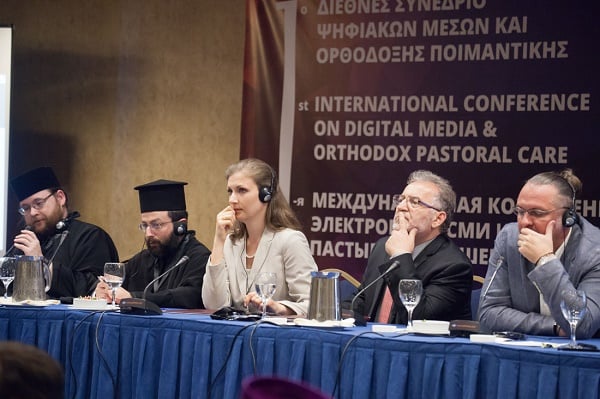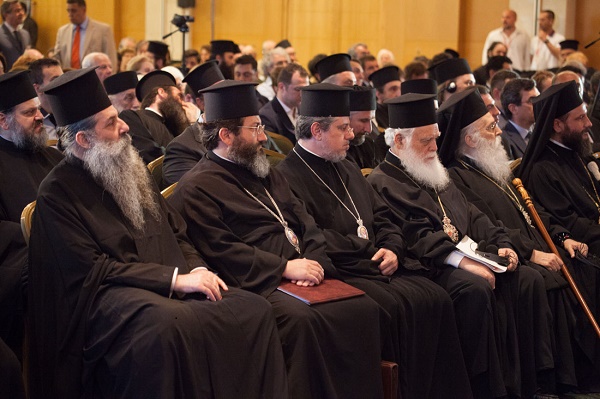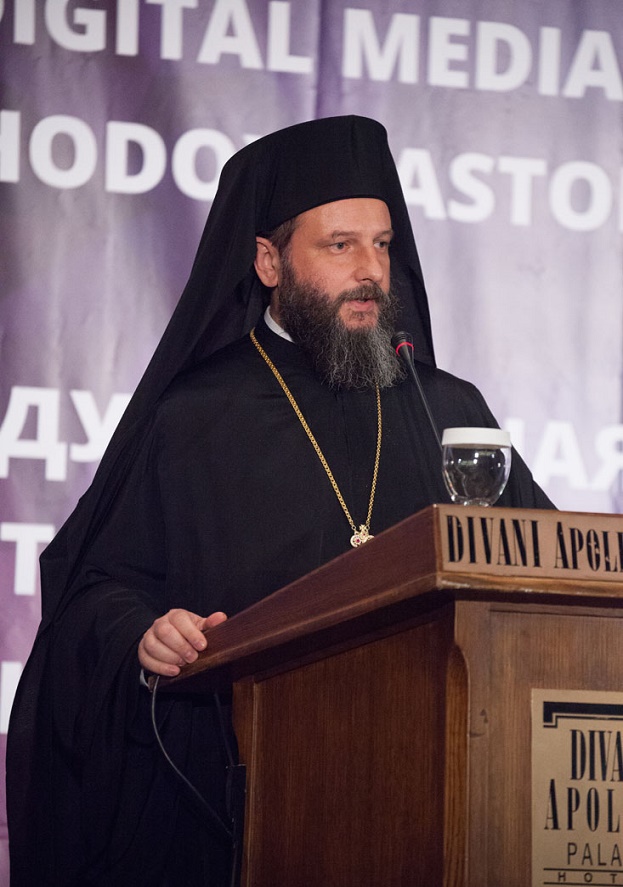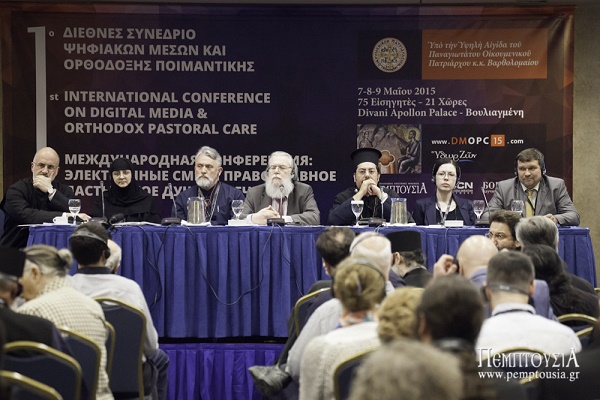Proceedings of the 1st International Conference on Digital Media and Orthodox Pastoral Care
19 May 2015Proceedings
of the 1st International Conference
on Digital Media and Orthodox Pastoral Care
Divani Apollon Palace, Vouliagmeni, 7, 8, 9 May 2015
The Internet represents a missionary challenge, but any launch into cyberspace requires proper preparation and the right timing. This, among much else, was stressed at the 1st International Conference on Digital Media and Orthodox Pastoral Care, which was held under the auspices of Ecumenical Patriarch Bartholomew between 7 and 9 May 2015, in the Holy Metropolis of Glyfada. The conference, the first of its kind in the world, was organized jointly by the web sites ‘Pemptousia’ from Greece, ‘OCN’, the Orthodox Christian Network, from the Unites States, and ‘Bogoslov’ from Russia, and was attended by 75 speakers from 21 countries, covering all the jurisdictions of the Orthodox Church.
A whole host of issues regarding the uses of the Internet were addressed from various points of view in the papers presented over the three days. The negative aspects of abuse and misuse were noted, as were the unrealistic expectations fostered by the normal use of modern digital means of communication and information. Also, emphasized were the dangers threatening both the human person and the relationship of the faithful to God and the Church in the reality shaped by new technologies.
Nevertheless, many contributors also highlighted the missionary challenge which has now arisen from the new social factors and the multi-faceted pastoral duty which the new technologies have created. The response of the faithful people of God to the initiatives which have been taken in various places for contact with the treasures of Christian spirituality was also presented.
At the same time, the opportunity was afforded to a large number of our brothers and sisters from every corner of the globe to present their digital work and ways of utilizing digital media in order to shape an authentic Christian conscience. Also highlighted was the nascent relationship between Orthodox monasticism and the Internet, its adoption into the realm of ascetic tradition and the proposals submitted by monks and nuns regarding mission work and the (re-)evangelization of the world.
Those present were unanimous in their view that any launch into cyberspace could not be undertaken without preparation or under unsuitable circumstances. An appropriate spiritual background is required on the part of the person in charge, as is an elevated sense of pastoral responsibility and, most assuredly, soundness and a Gospel ethos in the presentation of their discourse. Moreover, it should not be forgotten that the Internet is no more than a means and that therefore we ought not to use it indiscriminately, but rather in an ascetic manner, which means we should be imbued with a spirit of mindfulness, restraint and responsibility in our dealings with it. Only then will we emerge from the illusions of virtuality and our activities render tangible and beneficial results in real life.
A number of contributors made particularly valuable suggestions regarding the prospects for developing and coordinating the world of spiritual web-sites. It was proposed that the work of the conference be extended into other events and also that a permanent organ be created which would promote understanding, skills and mutual updating among those responsible for these sites- which, it is worth noting, function by and large on a voluntary basis and are motivated purely by missionary zeal. Another issue raised was the need for an independent agency to endorse those sites which have been recognized by their public as being sound and spiritually constructive.

During the proceedings, other related issues were discussed, such as the reliability of the provision of information regarding the Church and the need for the transmission of Church services. Besides this, specialists who attended shared their knowledge of specific matters closely related to the uses of the Internet. They touched upon the side-effects, and the threats, of a social, medical, psychological, penal nature, that lurk when we are exposed to cyberspace.
In conclusion, as the scientific committee recognized in its final session, there was a successful and fruitful dialogue with a rich exchange of views and a multi-faceted submission of proposals which have the potential to promote and reinforce the discourse of contemporary Orthodoxy in the new, digital conditions.
All those present, speakers, guests and the audience, lauded the initiative of the organizers in calling a conference of this nature, which was entirely necessary, given the reality being shaped by modern means of communication. They also expressed their satisfaction with the concern shown by the Mother Church of Constantinople for the burning issues facing the Orthodox flock. This concern is evident by the fact that the conference in question was held under the auspices of His All-Holiness, the Ecumenical Patriarch. It was also pointed out that many people, after attending the conference, were obliged to reconsider their initial reservations concerning the use of the Internet, once they realized its potential when used with moderation and restraint. There was a general desire to see the continuation of such initiatives, with the calling of other conferences, seminars and so on, so that today’s Orthodox discourse can gain its rightful place in the public dialogue and in spiritual deliberations the world over.
The proceedings of the conference were attended by more than 20 hierarchs, among whom were His Eminence Metropolitan Amfilohios of Kissamos and Selinon, as representative of the Ecumenical Patriarch Bartholomew; His Eminence Ioannis of Thermopylae as representative of Archbishop Ieronymos of Athens; His Grace Grigorios, Bishop of Mesaoria, as representative of His Beatitude Archbishop of Cyprus Chrysostomos; the local Metropolitan Pavlos of Glyfada; the representative of His Beatitude Patriarch John (Youhanna) of Antioch; the representative of His Beatitude Patriarch Theofilos of Jerusalem; the representative of His Beatitude Patriarch Daniïl of Romania; the representative of His Beatitude Patriarch Ilya of Georgia; the representative of His Beatitude Archbishop Anastasios of Albania; and representatives of other Orthodox Churches. Also present at the sessions and discussions were the people of God, both clergy and laity.

A team of interpreters covered the conference proceedings, translating the papers in real time into Greek, English and Russian. Moreover, the three days of the conference were transmitted live on the Internet via video live streaming so that people from all over the world, who had not had the opportunity to travel to Greece, were able to follow the proceedings.
Six hierarchs participated as speakers:
- Metropolitan Savvas of Pittsburgh (via video-call); Metropolitan Nektarios of Hong Kong; and Bishop Joseph of Patara (Argentina), all on behalf of the Ecumenical Patriarchate.
- Archbishop Nikiforos of Central Africa on behalf of the Patriarchate of Alexandria (though he was unable to attend due to the sudden deterioration in the health of his Elder, Spyridon Mikrayannanitis. His paper was read for him by a member of the staff of Pemptousia).
- Bishop Romanos of Edessa (Brazil) on behalf of the Patriarchate of Antioch.
- Metropolitan Ignatios of Dimitriada on behalf of the Church of Greece.
The Honorary Committee consisted of:
His Eminence Metropolitan Alexios of Atlanta, Ecumenical Patriarchate
His Eminence Metropolitan Elpidoforos of Prousa, Ecumenical Patriarchate
His Eminence Metropolitan Konstantinos of Singapore, Ecumenical Patriarchate
His Grace Bishop Makarios of Lampsakos, Ecumenical Patriarchate
His Grace Bishop Meletios of Nafkratis, Patriarchate of Alexandria
His Eminence Metropolitan Hilarion of Volokolamsk, Patriarchate of Russia
His Grace Bishop Veniamin of Borisof, Vicar of the Metropolitan of Minsk and Slutsk, Patriarchate of Russia
His Grace Bishop Vissarion of Tulcea, Patriarchate of Romania
His Eminence Metropolitan Gerasim of Zugdidi and Tsaishi, Patriarchate of Georgia
His Eminence Metropolitan Athanasios of Lemessos, Church of Cyprus
His Grace Bishop Ioannis of Thermopylae, Church of Greece
His Beatitude Metropolitan Savvas of Warsaw and All Poland, Church of Poland
His Grace Bishop Andon of Kruja, Assistant to the Archbishop, Church of Albania.
Participants in the Scientific Committee of the conference were
- Protopresbyter Vasileios Kalliakmanis, Professor at the Theological School of the Aristotle University of Thessaloniki
- Protopresbyter Christopher Metropulos, Head of the Orthodox Internet portal mycon.net
- Protopresbyter Pavel Velikanov, Professor of the Theological Academy of Moscow and editor-in-chief of the theological portal bogoslov.ru
- Protopresbyter Jivko Panev, Associate Professor of the Saint Serge Orthodox Theological Institute in Paris and Head of the French-speaking Orthodox Internet portal orthodoxie.com
- Protopresbyter Constantin Coman, Professor of the Theological School of the University of Bucharest.
On the evening of the first day of the proceedings, the main speech of the conference was delivered, on behalf of His All-Holiness Bartholomew, the Ecumenical Patriarch, by the Director of the Orthodox Academy of Crete, Dr. Konstantinos Zorbas. In his speech, Dr. Zorbas set out the central scientific coordinates of the theme of the conference, laying down in depth the theological foundations which should inform our use of the Internet.

At the end of the conference, on Saturday 9 May, 2015, those attending had the opportunity to listen to the inspired speech by His Eminence Jovan, Archbishop of Ochrid and Metropolitan of Skopje, who first analyzed the dogmatic requirements for the adoption of the Internet and then went on to mention in detail the ‘escape routes’ provided to him by the digital means of communication during his long years of torment, the result of the persecution aimed against him by the political authorities in his country.
The proceedings concluded with a showing of the documentary ‘Between Two Worlds’ which was filmed under the guidance of the Pemptousia web-site, on the subject of the work being carried out at the Monastery of the Holy Trinity in Halki by the brotherhood there and the preparations for the opening, God willing, of its theological school. Those attending enjoyed the high quality of the production in question, which was largely completed last August, and also includes interviews with His All-Holiness Bartholomew, the Ecumenical Patriarch, the Abbot of the Monastery of the Holy Trinity, His Eminence Elpidoforos, Metropolitan of Prousa and the former Abbot, His Eminence Elder Apostolos, Metropolitan of Derka, who served for many years at the monastery, which is situated on the famous ‘Hill of Hope’.
The Conference ended on Sunday 10 May, with the celebration of a hieratical Divine Liturgy, at the Church of Our Lady Faneromeni, in Vouliagmeni, at which the chief celebrant was His Eminence Amfilohios, Metropolitan of Kissamos and Selinon, as the representative of His All-Holiness Bartholomew, the Ecumenical Patriarch. Also taking part were His Eminence Jovan, Archbishop of Ochrid and Metropolitan of Skopje; His Eminence Metropolitan Gerasim of Zugdidi and Tsaishi; His Eminence Pavlos, Metropolitan of Glyfada; His Eminence Ioannis, Metropolitan of Thermopylae; Bishop Joseph of Patara; His Grace Bishop Veniamin of Borisof; Elder Efraim, the Abbot of the Holy and Great Monastery of Vatopaidi; and many priests.







